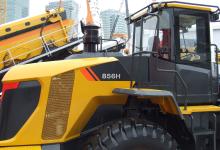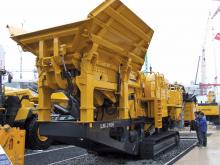There is increased competition in the wheeled loader market on a global basis - Mike Woof writes
The wheeled loader segment is one of the most hotly contested in the earthmoving machine market. There is an enormous array of manufacturers competing in this segment, including European, US, Japanese, South Korean and Chinese firms. This last group is of particular note as China represents the biggest single market for wheeled loaders in the world.
It is true that sales of wheeled loaders have dropped in China, while the market for excavators has grown. But all the same, wheeled loaders remain key machines amongst Chinese customers.
Caterpillar has responded to the divergence of demand for products by developing specific models for certain markets. The company builds high specification wheeled loaders in Europe and the US aimed at those markets, featuring the low emissions engines and exhaust after-treatment systems necessary.
Meanwhile the company also builds some models with Tier 3 and Tier 2 rated engines for sale into emergent markets. The 986H for example is built in China and is intended for customers in the emergent territories looking to replace ageing examples of early generation 988 loaders.
The 988 class model has grown in size since it was first introduced, which was why Caterpillar felt that there was room in the range for a slightly smaller model in the shape of the 986. This is pitched at emergent territories by featuring conventional controls and without the sophisticated electronics seen on models for sales in North America and Europe.
Meanwhile Volvo CE has responded to the need for machines for emergent markets through developing its Chinese
Understandably, given the strength of demand for wheeled loaders in China, the country’s own manufacturers have developed an impressive array of models. And nor have sales of these been restricted to China either, with units being supplied to emergent markets in particular.
The Chinese companies have been developing their ranges too and of particular note is the new 51tonne unit from
This tops the range of H series loaders, which previously ranged from 5.6-30tonnes in size. The 51tonne CLG8128H loader from LiuGong is powered by a diesel rated at 591kW and which meets Tier 3 emissions regulations, suiting it to sales in emergent markets.
The company is also rolling out the improved CLG890H model, which competes in the 30tonne class and is is powered by a diesel rated at 261kW. Of note too is LiuGong’s 17tonne class CLG856H, which is powered by a diesel rated at 162kW and which can be specified to meet the Tier 4 Final/Stage IV emissions requirements for North America and Europe respectively.
Another Chinese firm that has previously specialised in wheeled loaders, Shanghai-based
Meanwhile






